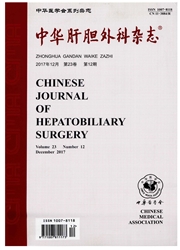

 中文摘要:
中文摘要:
目的 探讨阿司匹林协同干扰素-α(干扰素-α)诱导肝细胞癌(HCC)凋亡的作用机制.方法 体外培养人肝细胞癌Bel-7402细胞,分别以阿司匹林和IFN-α单独或联合作用于Bel-7402肝癌细胞.蛋白印迹检测细胞JAK/STAT通路相关蛋白JAK1 、JAK2 、TYK2、STAT1和STAT3的表达及磷酸化水平,并采用JAK2抑制剂AG490抑制JAK2的活性.RT-PCR检测阿司匹林和干扰素-α作用前后细胞IFN刺激性应答基因(IFN-stimulated gene,ISG)XAF1及G1P3等的转录水平.结果 IFN-α显著诱导STAT1和STAT3的磷酸化(P<0.05),阿司匹林可显著促进干扰素-α诱导的STAT1的磷酸化(P<0.05),但对IFN-α诱导的STAT3的磷酸化无显著影响.阿司匹林可显著促进IFN-α诱导JAK1和JAK2的磷酸化(P<0.05),但JAK2抑制剂AG490对阿司匹林协同IFN-α诱导的STAT1的磷酸化无抑制作用.此外,阿司匹林还可显著促进IFN-α诱导的XAF1 mRNA的转录而抑制G1P3mRNA的转录(P<0.05).结论 阿司匹林可通过激活JAK1/STAT1通路,上调促凋亡基因XAF1mRNA的转录及下调抗凋亡基因G1P3 mRNA的转录而发挥促进IFN-α诱导肝癌凋亡的作用.
 英文摘要:
英文摘要:
Objective To investigate the mechanism of aspirin in enhancing IFN-α induced apoptosis of hepatocellular carcinoma (HCC).Methods Bel-7402 HCC cells were cultured and treated with IFN-a and/or aspirin.The expressions and phosphorylation of JAK1,JAK2,TYK2,STAT1 and STAT3 were evaluated by Western blot,and AG490 was used to inhibit the activity of JAK2.The transcriptions of IFN-stimulated gene (ISG) mRNAs,such as XAF1 and G1P3,were evaluated by RT-PCR.Results Although IFN-a alone resulted in significant phosphorylation of both STAT1 and STAT3,aspirin only prompted the IFN-a induced phosphorylation of STAT1.Aspirin also significantly prompted the IFN-a induced phosphorylation of JAK1 and JAK2.After blocking the activity of JAK2 by AG490,the phosphorylation of STAT1 induced by combined use of IFN-a and aspirin was not influenced significantly.Furthermore,aspirin significantly upregulated the transcription of X-linked inhibitor of apoptosis-associated factor-1 (XAF1) and downregulated the transcription of G1P3 induced by IFN-a.Conclusion Aspirin upregulated the transcription of XAF1 and downregulated the transcription of G1P via JAK1/STAT1 pathway,thereby enhances IFN-a-induced apoptosis of HCC.
 同期刊论文项目
同期刊论文项目
 同项目期刊论文
同项目期刊论文
 Risk Factors, Prognosis, and Management of Early and Late Intrahepatic Recurrence After Resection of
Risk Factors, Prognosis, and Management of Early and Late Intrahepatic Recurrence After Resection of 期刊信息
期刊信息
